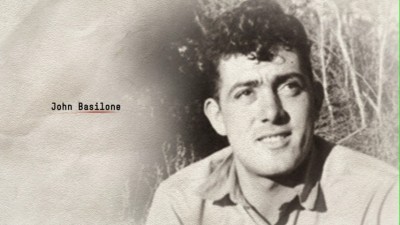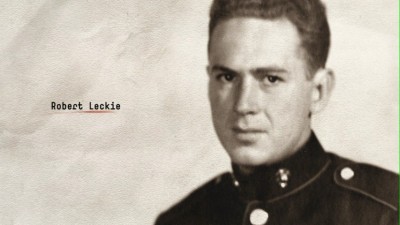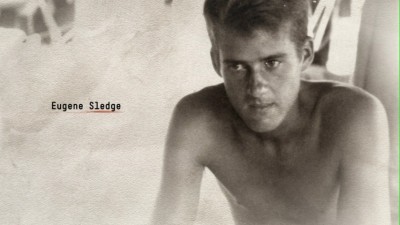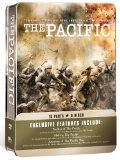| Reviews & Columns |
|
Reviews DVD TV on DVD Blu-ray 4K UHD International DVDs In Theaters Reviews by Studio Video Games Features Collector Series DVDs Easter Egg Database Interviews DVD Talk Radio Feature Articles Columns Anime Talk DVD Savant Horror DVDs The M.O.D. Squad Art House HD Talk Silent DVD
|
DVD Talk Forum |
|
|
| Resources |
|
DVD Price Search Customer Service #'s RCE Info Links |
|
Columns
|
|
|
Pacific, The
In the 1933 classic musical, "The Gold Diggers of 1933," Joan Blondell sings:
Remember my forgotten man,
you put a rifle in his hand.
You sent him far away,
you shouted "Hip hooray!"
But look at him today.
While at the time the song referred to forgotten veterans of WWI, the same sentiment could easily be applied to the veterans of World War II who fought in the Pacific campaign. It's hard to imagine that anyone could conceive the notion that anything important to the ultimate victory in the war could be forgotten, but stop and think for one moment. What images spring to mind when you think of World War II? D-Day, Pearl Harbor, Nazis, Hiroshima, the raising of the flag at Iwo Jima? What about the great movies immortalizing the soldiers who fought for their countries? Chances are they likely take place on the European front. Even the multitude of video games capitalizing on the public's fascination with the war seem to paint a portrait of the European front being "THE" war. The truth is, thousands of US Soldiers died on islands in the Pacific, fighting to force the Japanese back to their homeland. These men died on islands with well-known names like Iwo Jima, Okinawa, and Guadalcanal, but also lesser-known but equally important locales such as Cape Gloucester and Peleliu. "The Pacific" tells the story of the men who fought a battle not only against a relentless enemy, but the land itself and the horror of the human soul.
"The Pacific" is not "Band of Brothers," despite the obvious comparisons. They're both 10 episode miniseries' produced by Tom Hanks and Steven Spielberg. They both had their origins on HBO and pulled no punches in telling true stories. No one should expect "The Pacific" to be "Band of Brothers," because the Pacific was not Europe. As one soldier, long returned, now driving a taxi refuses cab fare from a recently returned soldier, puts it, "I had to fight in Europe but I got to liberty in London and Paris, all you guys got was jungle rot and malaria. It's the least I can do." After what viewers bear witness to over the course of the series, that is a poetic summary, but still doesn't truly capture the hell these men witnessed. The series follows three real Marines, John Basilone (Jon Seda), Robert Leckie (James Badge Dale), and Eugene Sledge (Joseph Mazello), with the memoirs of the latter two making up a large portion of the source material for the episodes. While the three men are never in a squad together (they do serve at the same battles at times), since they all served during slightly different time periods, their experiences provide a glimpse into what life was like during the hard battles stretching from just off the shores of Japan to a stone's throw to Australia.

The bad news is, many supporting characters don't always feel like flesh and blood figures. Even through the final episodes, I found it hard to pinpoint anyone by name. Most of that can be attributed to the time spent with them; in Sledge's story we are almost entirely with Sledge and his squad mates on the field of battle every minute, however Leckie's story is more about the mental break of one man, and Basilone's tale is much briefer, highlighting the loneliness of heroism. Still it's a flaw that is worth pointing out and persists through the more slowly paced set of opening episodes. Stick with it though, because once the series digs it's boots deep in the mud, it's a relentless and emotionally draining, but satisfying march to the finish.
The beauty of "The Pacific" isn't so much the stellar production design, which nails every aspect of the World War II era both on the frontlines and at the home front, but the character study approach it takes to leading viewers through the major battles. Basilone's story is the weakest, solely because the man himself was never afforded the opportunity to write a memoir. After being awarded the Medal of Honor for his heroic actions on Guadalcanal, Basilone was shipped home and used as promotional tool for selling war bonds. A man devoted to his country and the Marines, Basilone eventually got his wish to go back to service, tragically dying on the beaches of Iwo Jima, but not without showing his heroic nature on Guadalcanal was no fluke. Seda portrays the physically imposing man with a tender humanity, exposing the loneliness of being a national hero. He desires only for people to treat him like a regular person, not a manufactured deity of warfare. Even when swearing at a batch of new recruits under his command during training, it's obvious he's a man who has a sense of pride in doing his job and wants nothing more than to teach what he's learned (how to survive) to those who follow in his footsteps.

While we are introduced to Basilone and Bob Leckie around the same time early in the series, Leckie is the first character to get a series of episodes dedicated to his wartime experiences. As Basilone is sent home, Leckie is left in Melbourne to have a raucous good time with his buddies and along the way finds love with Stella (Claire van der Boom), the daughter of two Greek immigrants. It's not long before his unit is activated and he's back in action at Cape Gloucester, an island where the environment itself is just as deadly as the Japanese soldier. For the first time, viewers witness a lesser known battle of the war, but one no less dangerous. For Leckie though, the wounds he receives aren't physical, but psychological. James Badge Dale is quite the revelation, known primarily from his season three stint on "24" as Chase, he captures the mental breakdown slowly, transforming from a cocky rabble-rouser to a bedwetting, shell of a human. It's a tough arc to watch, even knowing Leckie will make it out, and though he conquers the surface demons before being shipped off to Peleliu, we know he'll never be the same man inside.
Last, but certainly not least is Eugene "Sledgehammer" Sledge, the most unlikely looking soldier of the lot. Initially a frail teenager, we only get glimpses of Sledge back home, getting medical clearance to enlist and one brief look at him in basic training. Sledge doesn't get to go home an early hero like Basilone or even get time off to mentally recover like Leckie; he's in it for the long haul and the largest portion of the series follows him from one battle to the next. Joseph Mazello delivers a very quiet but commanding performance, fitting of fresh-faced boy soldier who survives only by sheer luck and adrenaline during the intensely filmed beach landing at Peleliu. The brutality of enemy, environment, and fellow comrade alike shape Sledge into the man who returns home to coldly inform a smug college admissions representative that the Marines "taught him to kill Japs and he got real good at it." Sledge is constantly faced with death, seeing brothers-in-arms cut down before him, while he himself continually escapes harm. Unlike his best friend, Sid, who gets sent home just as he enters service, he's not content with making it out alive and being thankful. He will always have to wonder, "Why was I so lucky?"

In contrast to the reserved Sledge is Merriel Shelton, or Snafu as his friends call him. Brought to life by Rami Malek, Snafu nearly winds up being the most memorable character of the series, despite having being a secondary character. The complete opposite of the well-mannered and humane Sledge, Snafu is a trash talker who spends his time carving out the gold teeth from dead Japanese soldiers or occasionally disrespecting their corpses for his own amusement. He is a character we only see through the eyes of Sledge but as their odd friendship grows, we know that most assuredly in his own private moments, he's a man that faces the same fears and questions, he just deals with them in a more perverse way. In the end Sledge's story feels the most alive and easiest to relate to. He's like one of many men who enlisted to serve his country, he shows no signs like Basilone or Leckie of being in love with the Marine Corps. He does his job amidst the most impossible of odds and fortunately gets to return home.
The bulk of the series that is entrenched in combat does an amazing job of finding the balance between the action packed combat sequences and the quiet, but often brief moments, when we see how much the men evolve from skirmish to skirmish. The action never exploits the graphic nature of war, there's no thrill when our heroes gun down the enemies. There is only the sheer adrenaline and fear of whether they will live for the next fight against the mind that won't stay quiet, the environment that has no quarter for either side, and an enemy that we get little insight into, only because we see them through the eyes of the Americans. The Japanese soldier never surrenders, and as a result, their foes fully buy into the propaganda they are soulless killing machines, never openly realizing they themselves never give up either; the only difference is they were fortunate enough to be the victors.
As each year passes, we lose more and more of our World War II veterans, and in each of the roughly two-minute historical introductions narrated by Tom Hanks prior to each episode, we hear testimony from some nameless (until the final moments of the final episode) soldiers who back up every aspect of what "The Pacific" portrays. If nothing else their story has been immortalized in a sincere and exemplary miniseries that stands proudly next to its predecessor on the European front. There were no small or unimportant battles and we owe it to those who fought in them to know not just the Iwo Jima's and Guadalcanal's but the Peleliu's. It's the least we can do to ensure they won't ever become "forgotten men."
THE DVD
The Video
The 1.78:1 anamorphic widescreen transfer is near reference quality, only suffering from a level of detail that just isn't as sharp consistently. Every shade of the jungle is accurately rendered, free of nagging compression artifacts and unwanted noise, even as dirt readily flies at the camera. Contrast levels are absolutely perfect, a necessity given the many dark scenes that see both intense fighting and brief rest.
The Audio
The English 5.1 DTS soundtrack is definitely an improvement over the standard Dolby 5.1 track also included. Your subwoofer will get a workout during any battle scene, with the beach landing on Peleliu being a true standout. The rumble of the engines and sounds of gunfire whiz from speaker to speaker as the camera moves from boat to boat. It captures all the chaos as well as ensuring the dialogue is clear and well-balanced amidst the mayhem. A French 5.1 track and a Spanish 2.0 track are included. Subtitles run the gamut from English, French, and Spanish to Brazilian Portuguese, Chinese, Bahasa, Korean, and Thai.
The Extras
Sadly, the bonus disc is a little sparse, consisting of three features. "Profiles of the Pacific" runs 45-minutes and is easily the best, serving as mini documentary on all the men featured on the program. We get to see a speech made by the real John Basilone during his stint as a spokesman. Archival interviews with Sledge and Leckie are included, with the families of the men speaking for the now deceased men. Additionally a handful of men who served and survived with all three men are interviewed and speak briefly about the events that were eventually portrayed in the series. It's a shame the feature wasn't twice as long as all the stories are captivating and really drive home how well "The Pacific" gets it right.
The remaining two features are "Making of 'The Pacific'" and "Anatomy of 'The Pacific War'" with the latter giving a brief overview of the war in the Pacific and the former being your standard promotional featurette hyping the series while providing some decent, but brief insight into the production.
It's also worth mentioning the discs are packaged in a nice foldout digipack, housed in a beautiful embossed tin case, much like "Band of Brothers." It's truly a classy looking package.
Final Thoughts
"The Pacific" is a nearly flawless masterpiece. A painstakingly authentic testament to a dark time in the history of this planet, it's a series that should have a place in your film library, even if you aren't a fan of war films. It's the definitive look at the battles in the Pacific with an equally impressive technical presentation. DVD Talk Collector Series.
|
| Popular Reviews |
| Sponsored Links |
|
|
| Sponsored Links |
|
|
| Release List | Reviews | Shop | Newsletter | Forum | DVD Giveaways | Blu-Ray | Advertise |
|
Copyright 2024 DVDTalk.com All Rights Reserved. Legal Info, Privacy Policy, Terms of Use,
Manage Preferences,
Your Privacy Choices | |||||||













